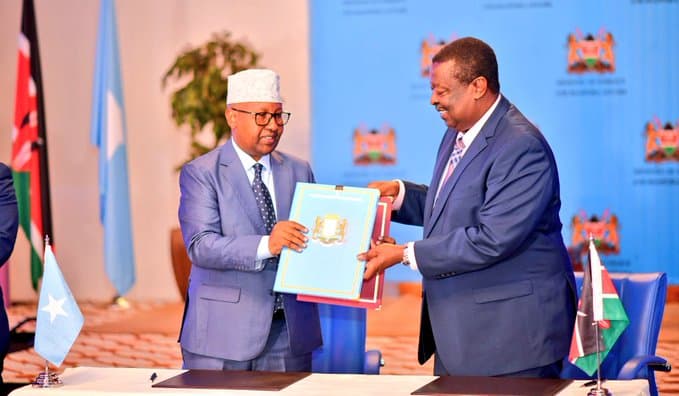We're loading the full news article for you. This includes the article content, images, author information, and related articles.
Kenya's Prime Cabinet Secretary Musalia Mudavadi and Somalia's envoy Ilyas Ali Jabril held talks to enhance bilateral relations, focusing on regional stability, counter-terrorism, and economic cooperation amidst ongoing Horn of Africa challenges.

Kenya and Somalia are strengthening their bilateral ties, with a focus on regional peace and economic growth, following high-level discussions between Prime Cabinet Secretary and Cabinet Secretary for Foreign and Diaspora Affairs Musalia Mudavadi and Somalia’s Ambassador to Kenya, Ilyas Ali Jabril. The meeting, held on Wednesday, October 22, 2025, at the Ministry of Foreign and Diaspora Affairs headquarters in Nairobi, aimed to deepen cooperation in critical areas such as counter-terrorism, cross-border trade, education exchange, and infrastructure development.
Mudavadi underscored the importance of peace and security as fundamental to Africa's progress, stating that stability across the continent is essential for sustainable growth, trade, and people-to-people integration. He affirmed Kenya's commitment to advancing continental stability, guided by unity, cooperation, and historical bonds with its neighbours and partners.
The discussions occur as the Horn of Africa navigates significant security and humanitarian challenges, including the persistent threat of extremism, climate-induced displacement, and food insecurity. Kenya and Somalia share extensive historical, cultural, and economic ties that span decades. Kenya has been a key partner in Somalia's peace and reconstruction efforts, notably by hosting a substantial number of Somali refugees and contributing to peacekeeping operations under the African Union Transition Mission in Somalia (ATMIS).
The engagement aligns with broader regional efforts to foster stability and economic integration. Both nations are members of the Intergovernmental Authority on Development (IGAD), an eight-country trade bloc in Africa with a mandate to achieve peace and sustainable development in the Horn of Africa. Collaborative efforts in counter-terrorism are particularly crucial given the shared threat of extremist groups like Al-Shabaab, which has impacted both countries.
Prime Cabinet Secretary Mudavadi conveyed the outcomes of the meeting via his official X account, highlighting productive discussions that explored avenues for fostering regional stability, deepening bilateral cooperation, and opening new pathways for shared growth and prosperity.
Enhanced cooperation between Kenya and Somalia is expected to bolster regional security efforts, potentially mitigating the impact of extremist activities and facilitating more stable trade routes. Improved infrastructure and educational exchanges could also foster long-term economic development and human capital growth in both nations. However, the complex security landscape of the Horn of Africa means that sustained commitment and resources will be necessary to achieve lasting peace and stability.
Specific timelines for the implementation of new collaborative projects in trade, education, and infrastructure were not detailed in the public statements. The exact mechanisms for strengthening counter-terrorism efforts beyond existing frameworks also remain to be fully elaborated.
The recent talks signify a continued commitment to bilateral engagement. Future steps will likely involve technical committees from both countries working to operationalise the discussed areas of collaboration. Regular high-level consultations are anticipated to monitor progress and address emerging issues.
Observers will be watching for concrete outcomes from these discussions, particularly in the areas of joint security operations, the implementation of cross-border trade agreements, and progress on infrastructure projects. The stability of the Horn of Africa remains a critical factor, and the effectiveness of these bilateral efforts in addressing regional challenges will be a key indicator.
Keep the conversation in one place—threads here stay linked to the story and in the forums.
Sign in to start a discussion
Start a conversation about this story and keep it linked here.
Other hot threads
E-sports and Gaming Community in Kenya
Active 9 months ago
The Role of Technology in Modern Agriculture (AgriTech)
Active 9 months ago
Popular Recreational Activities Across Counties
Active 9 months ago
Investing in Youth Sports Development Programs
Active 9 months ago